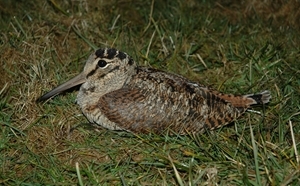 They have been widely featured on the BBC programme Springwatch as well as the BBC’s One Show. Now the secret life of the elusive woodcock is being revealed in west Wales by one of the world’s leading authorities on woodcock ecology, Dr Andrew Hoodless on Friday 15th November at the Abercothi Estate in Carmarthen.
They have been widely featured on the BBC programme Springwatch as well as the BBC’s One Show. Now the secret life of the elusive woodcock is being revealed in west Wales by one of the world’s leading authorities on woodcock ecology, Dr Andrew Hoodless on Friday 15th November at the Abercothi Estate in Carmarthen.
This event, which is being kindly hosted by Simon Hart MP, will enable audience members to hear about the extraordinary studies on woodcock being carried out by the Game & Wildlife Conservation Trust (GWCT), a leading research charity.
To date, this ground-breaking research has unlocked many of the mysteries surrounding this fascinating species. Over the last two years, twenty-four woodcock from various sites across Britain and Ireland, including west Wales, have been fitted with tiny satellite transmitters in order to track their migration routes back to their breeding grounds as far away as central Siberia in Russia as well as other countries within Eastern Europe.
Dr Andrew Hoodless from the GWCT explains the significance of this research, “For the first time, this state-of-the-art technology is helping us to identify the huge distances that migrating woodcock are travelling to reach their breeding grounds. One particular bird has travelled at least 39,000 km in the course of his lifetime. It is quite heart-stopping to watch these perilous journeys as they get blown off course or get delayed by bad weather.”
Simon Hart MP for Carmarthen West and South Pembrokeshire is a huge supporter of this research and said, “Woodcock are an iconic species in west Wales and a source of fascination to all of us who take pride in our landscape."
In west Wales, with assistance from the Woodcock Network run by local sporting artist Owen Williams, four birds have had satellite transmitters attached to them. Two of these birds are now sending signals back to Andrew Hoodless and his team from their breeding grounds in Russia. The researchers are currently eagerly awaiting new satellite signals, indicating that the woodcock will be starting the long flights back to their overwintering areas in Wales.
Andrew Hoodless explains how audiences in Wales can help increase our knowledge of woodcock. He said, “We are very keen to satellite tag more birds from west Wales and hope that the evening presentation on the 15th November will enable us to raise funds so that more woodcock in Wales can be fitted with satellite-tracking devises.
“This unique research is vital because across Europe its status is poorly documented and compared to many birds we know very little about its behaviour and ecology because of its secretive nature. Our satellite-tracking will help inform international conservation policies for woodcock in the future.”
The perilous flights of the satellite-tracked woodcock can be viewed in ‘real time’ on the GWCT’s dedicated website at: www.woodcockwatch.com.
Simon Hart added, "The GWCT project helps us underpin generations of local knowledge with real science and means we can be confident of a sustainable population in the future.”
To attend this free fascinating talk by Dr Andrew Hoodless from the Game & Wildlife Conservation Trust on Friday 15th November at the Abercothi Estate, please contact Max Kendry on 017898 40348 or email: mkendry@gwct.org.uk. Refreshments will be provided and this event is being held by kind permission of Sir Edward Dashwood Bt.
END
Photocaption: Woodcock with satellite tracking devices attached by GWCT researchers in Wales have travelled astonishing distances to breeding sites as far away as central Siberia.
Notes to editors
The Game & Wildlife Conservation Trust – providing research-led conservation for a thriving countryside. The GWCT is an independent wildlife conservation charity which has carried out scientific research into Britain’s game and wildlife since the 1930s. We advise farmers and landowners on improving wildlife habitats. We employ more than 60 post-doctoral scientists and other research staff with expertise in areas such as birds, insects, mammals, farming, fish and statistics. We undertake our own research as well as projects funded by contract and grant-aid from government and private bodies.
For information, contact:
Eleanor Williams
Telephone: 07592 025476
Email: press@gwct.org.uk